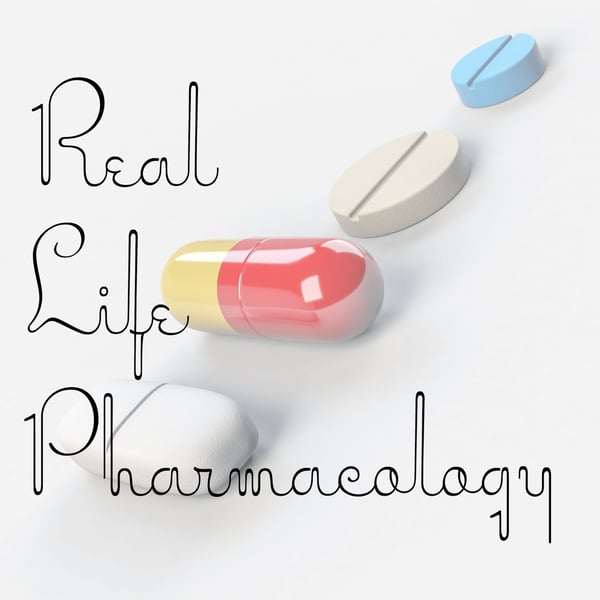Caffeine Pharmacology
Real Life Pharmacology - Pharmacology Education for Health Care Professionals
Eric Christianson, PharmD; Pharmacology Expert and Clinical Pharmacist
5 • 716 Ratings
🗓️ 21 May 2020
⏱️ 13 minutes
🧾️ Download transcript
Summary
Caffeine can inhibit CYP1A2 and also be affected by CYP1A2 inhibitors. I discuss some examples in the podcast.
It is critical to inquire about caffeine intake when patients are reporting insomnia.
Caffeine has been associated with increases in pulse and blood pressure. Be sure to ask about caffeine intake when assessing these vital signs.
Transcript
Click on a timestamp to play from that location
| 0:00.0 | Hey all, welcome back to the Real Life Pharmacology podcast. I'm your host, pharmacist Eric Christensen. |
| 0:06.2 | Thanks so much for listening. You can certainly find us on iTunes or anywhere else. If you enjoy the podcast today, |
| 0:12.1 | definitely leave a rating and review. We're greatly appreciative of that. So the drug of the day today that I wanted to talk about was caffeine. |
| 0:22.6 | Caffeine, you may not consider a drug. |
| 0:25.3 | You may consider more of a supplement. |
| 0:27.9 | But regardless of how you feel, it has physiological effects on the body. |
| 0:34.3 | It has potential for adverse effects as we escalate doses, and we've got the |
| 0:40.6 | potential for drug interactions as well. So I think it's very important to recognize this, |
| 0:48.5 | given the vast amount of use of caffeine that our society uses out there. |
| 0:55.9 | So most often, where I see caffeine used is obviously in beverages, things of that nature. |
| 1:04.3 | However, there are multiple different tablets, formulations that are available over the counter as well. |
| 1:13.6 | Often they're referred to as energy boosting or increased alertness or staying awake. |
| 1:22.4 | Brand name is no dose, for example. |
| 1:27.4 | So understanding that, knowing that, we know caffeine is a stimulant, and that's what it's |
| 1:33.9 | going to do. |
| 1:35.7 | As we escalate doses, we're likely to get more and more stimulant effects. |
| 1:41.1 | But that comes at a risk of complications as well. |
| 1:46.8 | So let's get back, kind of round this into shape. |
| 1:51.4 | Some brand names I've seen stay awake, no-dose I mentioned. |
| 1:55.4 | It's also in excedrin, in management of headaches, often obviously in combination with other drugs such as |
| 2:04.7 | inseds and aspirin or acetaminophen, but can be utilized in that situation as well. |
| 2:14.1 | Mechanistically, caffeine is a phosphodestriase inhibitor, which can increase cyclic AMP. |
... |
Transcript will be available on the free plan in -1774 days. Upgrade to see the full transcript now.
Disclaimer: The podcast and artwork embedded on this page are from Eric Christianson, PharmD; Pharmacology Expert and Clinical Pharmacist, and are the property of its owner and not affiliated with or endorsed by Tapesearch.
Generated transcripts are the property of Eric Christianson, PharmD; Pharmacology Expert and Clinical Pharmacist and are distributed freely under the Fair Use doctrine. Transcripts generated by Tapesearch are not guaranteed to be accurate.
Copyright © Tapesearch 2025.

